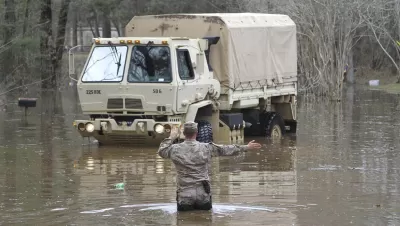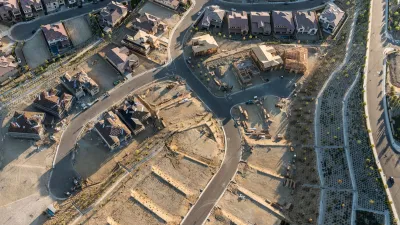The Biden administration announced guidance for $7.3 billion in funding under the PROTECT Formula Program at the end of July.

The U.S. Department of Transportation’s Federal Highway Administration (FHWA) recently announced new guidance and $7.3 billion in funding for the PROTECT Formula Program. PROTECT is a first-of-its kind program, made possible by the Infrastructure Investment and Jobs Act, “to help states and communities better prepare for and respond to extreme weather events like wildfires, flooding, and extreme heat,” according to an FHWA press release published on July 29.
“The new Promoting Resilient Operations for Transformative, Efficient, and Cost-Saving Transportation (PROTECT) Formula Program funding is available to states over five years to make transportation infrastructure more resilient to future weather events and other natural disasters by focusing on resilience planning, making resilience improvements to existing transportation assets and evacuation routes, and addressing at-risk highway infrastructure,” according to the press release.
The press release also indicates that transit projects, bicycle and pedestrian facilities, and port facilities will all be eligible for funding under the program.
“Eligible resilience improvements can involve adapting existing transportation infrastructure or new construction to keep communities safe by bolstering infrastructure’s ability to withstand extreme weather events and other physical hazards that are becoming more common and intense. Eligible project choices may include the use of natural or green infrastructure to buffer future storm surges and provide flood protection, as well as aquatic ecosystem restoration. PROTECT projects can also help improve the resilience of transportation networks that serve traditionally underserved and underrepresented communities, particularly during natural disasters and evacuations,” according to the press release.
More details of the PROTECT program are available on the FHWA website.

Maui's Vacation Rental Debate Turns Ugly
Verbal attacks, misinformation campaigns and fistfights plague a high-stakes debate to convert thousands of vacation rentals into long-term housing.

Planetizen Federal Action Tracker
A weekly monitor of how Trump’s orders and actions are impacting planners and planning in America.

In Urban Planning, AI Prompting Could be the New Design Thinking
Creativity has long been key to great urban design. What if we see AI as our new creative partner?

King County Supportive Housing Program Offers Hope for Unhoused Residents
The county is taking a ‘Housing First’ approach that prioritizes getting people into housing, then offering wraparound supportive services.

Researchers Use AI to Get Clearer Picture of US Housing
Analysts are using artificial intelligence to supercharge their research by allowing them to comb through data faster. Though these AI tools can be error prone, they save time and housing researchers are optimistic about the future.

Making Shared Micromobility More Inclusive
Cities and shared mobility system operators can do more to include people with disabilities in planning and operations, per a new report.
Urban Design for Planners 1: Software Tools
This six-course series explores essential urban design concepts using open source software and equips planners with the tools they need to participate fully in the urban design process.
Planning for Universal Design
Learn the tools for implementing Universal Design in planning regulations.
planning NEXT
Appalachian Highlands Housing Partners
Mpact (founded as Rail~Volution)
City of Camden Redevelopment Agency
City of Astoria
City of Portland
City of Laramie





























